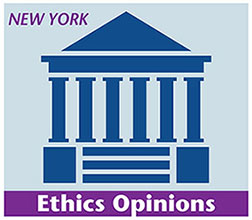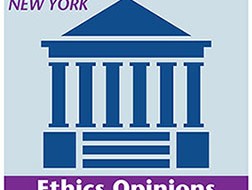Recent N.Y. Ethics Opinions: February 2016
By Tyler Maulsby, Associate, Frankfurt Kurnit Klein & Selz
Here are summaries of ethics opinions issued October and December 2015. The opinions were issued by the NYSBA Committee on Professional Ethics and the NYC Bar Association Committee on Professional Ethics. NYLER will continue to provide updates on new ethics opinions issued by these and other ethics committees in New York State.
For information about how to obtain an ethics opinion from the NYS Bar Association Committee on Professional Ethics, please visit http://www.nysba.org/Ethics/.
For information about how to obtain an ethics opinion from the NYC Bar Association Committee on Professional Ethics, please visit http://www.nycbar.org/ethics/informal-ethics-opinions/
NEW YORK STATE BAR ASSOCIATION OPINIONS
NYSBA Ethics Op. 1070 (Oct. 2015)
Obligations to Joint Clients
Opinion 1070 analyzes a lawyer’s duty when representing multiple clients in the same matter, where one client requests that the lawyer withhold information from the other joint clients. The inquiring lawyer (Lawyer A) represents several clients in a real estate litigation. In the course of the representation, one of the lawyer’s clients directs Lawyer A to provide a copy of the client’s file to Lawyer B. The client also directs Lawyer A not to disclose the request to the other joint clients. The retainer agreement between the joint clients and Lawyer A does not address confidentiality of communications from any joint client vis-à-vis the others. The Opinion concludes that while a client generally is entitled to full access to his or her file, if Lawyer A believes that the client’s request for the file is material to the other co-clients, the lawyer may not comply with the client’s request. The Opinion reasons that in a joint representation, there is a “presumption that the lawyer will share material information” between co-clients absent some agreement to the contrary. Similarly, a lawyer is required to keep all clients informed about any “material developments” in the representation. Thus, the Opinion reasons, Rule 1.15(c)(4)’s requirement that the lawyer promptly deliver client property is not applicable where the client’s request would “cause a breach by the lawyer of duties to the other co-clients.” As a result, the Opinion instructs the inquiring lawyer to inform the requesting client that “if he or she does not withdraw the request for confidentiality, the lawyer will not be able to provide a copy of the file, but that, if the client authorizes the lawyer to disclose the requesting client’s request for the file to the co-clients, the lawyer will provide the file to the requester.”
The full opinion is available at: http://www.nysba.org/CustomTemplates/Content.aspx?id=60194
NYSBA Ethics Op. 1071 (Oct. 2015)
Partisan Political Activities by Municipal Attorney
In Opinion 1071 the inquiring lawyer works for the Civilian Complaint Review Board (CCRB), a municipal agency tasked with investigating claims of police misconduct and referring any substantiated claims for administrative and/or criminal prosecution. The Opinion addresses whether the inquiring lawyer may engage in partisan political activity. The Opinion first cites a number of earlier ethics opinions which concluded that state prosecutors and attorneys that work for state investigative agencies may not engage in partisan political activities without violating Rule 8.4(d) (“conduct prejudicial to the administration of justice”). Opinion 1071 reaches a similar conclusion. The Opinion reasons that even though the CCRB may have limited jurisdiction, the agency “plays a critical role in influencing the judgments of those with the final say” on whether charges are brought against a police officer. As a result, if the attorney were to engage in partisan political activities, it could create the “perception that political attitudes may affect the decision-making of attorneys who have within their power the ability to instigate (or not) further investigations and to affect (whether adversely or not) the careers and reputations of individuals they are charged with monitoring.”
The full opinion is available at: http://www.nysba.org/CustomTemplates/Content.aspx?id=60196
NEW YORK CITY BAR ASSOCIATION OPINIONS
N.Y. City Formal Eth. Op. 2015-7 (Dec. 2015)
Attorney Advertising and LinkedIn
Opinion 2015-7 addresses two questions: (1) under what circumstances does a lawyer’s LinkedIn profile constitute attorney advertising; and (2) if a lawyer’s LinkedIn profile does constitute attorney advertising, what are the lawyer’s obligations under the advertising rules? The Opinion concludes that a lawyer’s LinkedIn profile does not constitute attorney advertising unless it meets five criteria. Specifically, (1) it is a communication made by or on behalf of the lawyer; (2) the “primary purpose” of the LinkedIn profile is to attract new clients to “retain the lawyer for pecuniary gain”; (3) the lawyer’s profile relates to the legal services offered by the lawyer; (4) the lawyer intends for her profile to be viewed by potential clients; and (5) the content of the LinkedIn profile does not fit within any of the recognized exceptions to attorney advertising. The Opinion’s conclusion is based largely on the definition of attorney advertising in Rule 1.0(a), which is “any public or private communication made by or on behalf of a lawyer or law firm about that lawyer or law firm’s services, the primary purpose of which is for the retention of the lawyer or law firm.” Owing to that definition, the Opinion concludes, “it should not be presumed that a lawyer who posts information about herself on LinkedIn necessarily does so for the primary purpose of attracting paying clients.” However, if a lawyer’s LinkedIn profile or content posted on the lawyer’s profile does meet the definition of attorney advertising, the lawyer must comply with the various requirements in the New York Rules that govern attorney advertising. This includes: labeling the content on the profile “Attorney Advertising” (Rule 7.1(e)); including the lawyer’s name, principal law office address and telephone number on the advertisement (Rule 7.1(h)); ensuring that the lawyer pre-approve any content before it is posted (Rule 7.1(k)); and preserving a copy of the advertisement for at least one year (Rule 7.1(k)). Also, Rule 7.1(a)(1) prohibits the lawyer from posting any false, deceptive or misleading statements in any advertising. The Opinion advises that before disseminating any advertisements on LinkedIn or any other social media, the attorney should ensure that the advertisements comply with all the requirements in Article 7 of the Rules of Professional Conduct.
The full opinion is available at: http://www.nycbar.org/ethics/ethics-opinions-local/2015opinions/2350-formal-opinion-2015-7-application-of-attorney-advertising-rules-to-linkedin
N.Y. City Formal Eth. Op. 2015-8 (Dec. 2015)
Fee-Sharing with Law Firms with Nonlawyer Owners
Opinion 2015-8 addresses whether a New York lawyer may share fees with a law firm with nonlawyer owners that is located in a jurisdiction that authorizes nonlawyer ownership of law firms. Rule 5.4(a) of the New York Rules prohibits lawyers from sharing legal fees with nonlawyers. Similarly, Rules 5.4(b) and (c) prohibit lawyers from entering into partnerships with nonlawyers for the purpose of providing legal services. However, the Opinion recognizes that the District of Columbia and several foreign jurisdictions allow lawyers to practice in firms with nonlawyer owners. The Opinion concludes that a New York lawyer may divide legal fees with such firms without violating New York’s prohibition on fee-sharing with nonlawyers. The opinion reasons that such an arrangement “presents little risk that a nonlawyer would impair a New York lawyer’s independent professional judgment.”
The full opinion is available at: http://www.nycbar.org/ethics/ethics-opinions-local/2015opinions/2351-formal-opinion-2015-8-fee-sharing-with-law-firms-that-permit-nonlawyers-to-have-a-financial-interest-or-managerial-authority-where-such-law-firms-are-located-in-jurisdictions-tha
Get CLE Credit for this month’s articles (February 2016).
DISCLAIMER: This article provides general coverage of its subject area and is presented to the reader for informational purposes only with the understanding that the laws governing legal ethics and professional responsibility are always changing. The information in this article is not a substitute for legal advice and may not be suitable in a particular situation. Consult your attorney for legal advice. New York Legal Ethics Reporter provides this article with the understanding that neither New York Legal Ethics Reporter LLC, nor Frankfurt Kurnit Klein & Selz, nor Hofstra University, nor their representatives, nor any of the authors are engaged herein in rendering legal advice. New York Legal Ethics Reporter LLC, Frankfurt Kurnit Klein & Selz, Hofstra University, their representatives, and the authors shall not be liable for any damages resulting from any error, inaccuracy, or omission.
Related Posts
« Miracle on Eagle Street: New York’s Temporary Practice Rule Playing Nicely with Others: Cross-Border Fee Sharing with Firms That Play by Different Rules »







